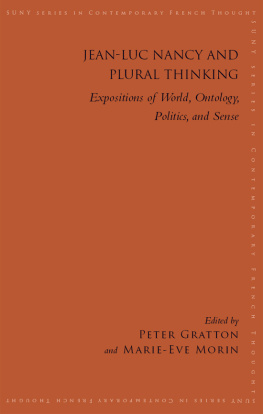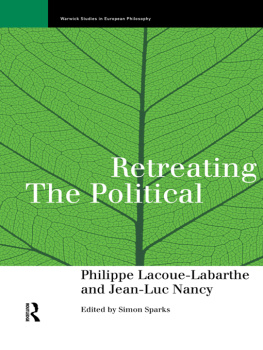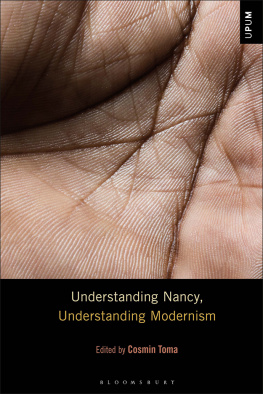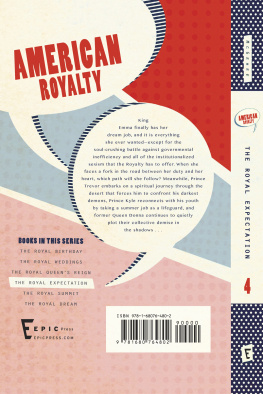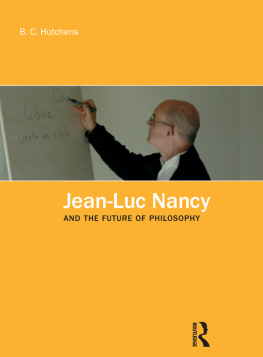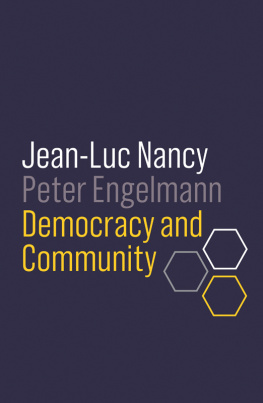Nancy Jean-Luc - Expectation
Here you can read online Nancy Jean-Luc - Expectation full text of the book (entire story) in english for free. Download pdf and epub, get meaning, cover and reviews about this ebook. year: 2018, publisher: Fordham University Press, genre: Romance novel. Description of the work, (preface) as well as reviews are available. Best literature library LitArk.com created for fans of good reading and offers a wide selection of genres:
Romance novel
Science fiction
Adventure
Detective
Science
History
Home and family
Prose
Art
Politics
Computer
Non-fiction
Religion
Business
Children
Humor
Choose a favorite category and find really read worthwhile books. Enjoy immersion in the world of imagination, feel the emotions of the characters or learn something new for yourself, make an fascinating discovery.

- Book:Expectation
- Author:
- Publisher:Fordham University Press
- Genre:
- Year:2018
- Rating:4 / 5
- Favourites:Add to favourites
- Your mark:
- 80
- 1
- 2
- 3
- 4
- 5
Expectation: summary, description and annotation
We offer to read an annotation, description, summary or preface (depends on what the author of the book "Expectation" wrote himself). If you haven't found the necessary information about the book — write in the comments, we will try to find it.
Expectation — read online for free the complete book (whole text) full work
Below is the text of the book, divided by pages. System saving the place of the last page read, allows you to conveniently read the book "Expectation" online for free, without having to search again every time where you left off. Put a bookmark, and you can go to the page where you finished reading at any time.
Font size:
Interval:
Bookmark:
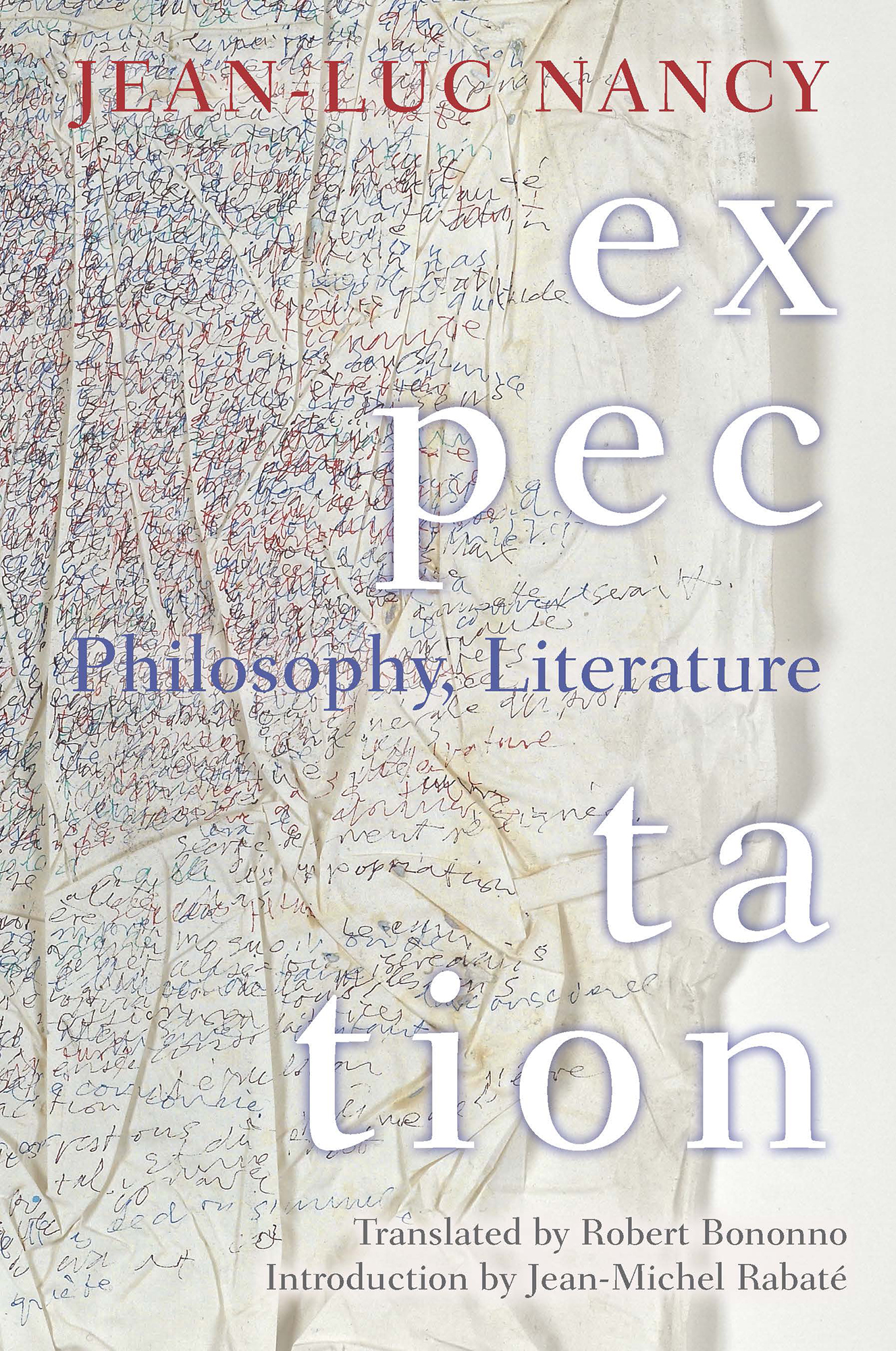
EXPECTATION
Also by Jean-Luc Nancy and published by Fordham University Press
The Ground of the Image (2005)
Listening (2007)
Philosophical Chronicles (2008)
Dis-Enclosure: The Deconstruction of Christianity (2008)
Noli me tangere: On the Raising of the Body (2008)
Corpus (2008)
On the Commerce of Thinking: Of Books and Bookstores (2008)
The Fall of Sleep (2009)
The Truth of Democracy (2010)
God, Justice, Love, Beauty: Four Little Dialogues (2011)
Adoration: The Deconstruction of Christianity II (2013)
The Pleasure in Drawing (2013)
Corpus II: Writings on Sexuality (2013)
Being Nude: The Skin of Images (with Federico Ferrari, 2014)
Identity: Fragments, Frankness (2015)
After Fukushima: The Equivalence of Catastrophes (2015)
Whats These Worlds Coming To? (with Aurlien Barrau, 2015)
Intoxication (2016)
Ego Sum: Corpus, Anima, Fabula (2016)
The Disavowed Community (2016)
Coming (with Adle Van Reeth, 2017)
The Banality of Heidegger (2017)
The Possibility of a World: Conversations with Pierre-Philippe Jandin (2017)
PHILOSOPHY, LITERATURE
JEAN-LUC NANCY
Translated by
ROBERT BONONNO
Texts compiled with the assistance of
GINETTE MICHAUD
FORDHAM UNIVERSITY PRESS
New York 2018
Copyright 2018 Fordham University Press
Translation copyright 2018 Robert Bononno
All rights reserved. No part of this publication may be reproduced, stored in a retrieval system, or transmitted in any form or by any meanselectronic, mechanical, photocopy, recording, or any otherexcept for brief quotations in printed reviews, without the prior permission of the publisher.
This book was originally published in French as Jean-Luc Nancy, Demande: Philosophie, littrature, Copyright ditions Galile, 2015. Five texts from DemandeFaire, la posie, Compter avec la posie. Entretien avec Pierre Alferi, Il dit, Pan pour Aphrodite, and Vox clamans in desertoare not included in the present volume but appear in English in Jean-Luc Nancy, Multiple Arts: The Muses II, ed. Simon Sparks (Stanford: Stanford University Press, 2006).
The translations of Noli Me Frangere, Exergues, and Psyche first appeared in Jean-Luc Nancy, The Birth to Presence, copyright 1993 by the Board of Trustees of the Leland Stanford Jr. University. All rights reserved. Reprinted by permission of the publisher, Stanford University Press, sup.org.
Ouvrage publi avec le concours du Ministre franais charg de la CultureCentre National du Livre.
This work has been published with the assistance of the French Ministry of CultureNational Center for the Book.
Fordham University Press has no responsibility for the persistence or accuracy of URLs for external or third-party Internet websites referred to in this publication and does not guarantee that any content on such websites is, or will remain, accurate or appropriate.
Fordham University Press also publishes its books in a variety of electronic formats. Some content that appears in print may not be available in electronic books.
Visit us online at www.fordhampress.com.
Library of Congress Cataloging-in-Publication Data available online at http://catalog.loc.gov.
As is often the case, my title is not easy to translate. Nothing is easy in any translation, and Robert Bononno knows very well the many and great difficulties he has encountered in this textunexpected, of course, and unwanted (especially in some texts written in the 1970s with the wit and joking taste of the time). That is why I start this preface writing an English of my own in order to lighten his work and to help the reader laugh.
The French title is Demande. In English, demand resonates with much greater imperiousness or exigency than in French. A demande is a request and can even be a kind of prayer, supplication, or entreaty. Colored by psychoanalysis, it resonates like a demand for love, which is quite distinct from both need and desire. The demande waits, hopes, wishes. Desire advances, rises, and moves forward.
Expectation responds better to what Demande says to me in French. Philosophy and literature are in need of one another: not because they desire something of the other but as a demand for love or, at least, for encounter and sharing. Moreover, expectations are not symmetrical and in that sense I need to correct my introductory Coda somewhat. Philosophy expects more than literature because philosophy is experienced through suffering and is required to have a sense, whereas literature continues to defy sense. From this point of view, the expectational affect is much stronger in philosophy. On the other hand, literature expects to make sense while defying demonstrative and argumentative regimes. It doesnt want to be merely decorative or entertaining.
Philosophy does indeed hope to achieve the freedom of the narrative or myth, which no concept can touch. Literature would like to elide or elude the concept so that sense might be more strongly felt. Their division is a division of sense itself. The division that forms what we call sense: from the outset, the word itself names its own division, its fissure, its opening.
But I have to stop here, for Im beginning to rewrite the entire book... or a different one.
Jean-Michel Rabat
This compilation of essays and poems by one of todays most distinguished philosophers is a summa poetica. Expectation provides a non-systematic corpus of poetics that is both retrospective and prospective. In a classically philological mode, Nancy is attentive to the genealogy of terms such as aiodos, parodos, and muthos; at times, more experimental explorations pave the way for the creation of new forms valid for the twenty-first century. The texts collected in Expectation were written over a period of thirty-five years and thus offer multiple pathways for investigating, inchoativelythat is, in a gesture that is always new and always to be repeatedthe loaded, enigmatic, and tantalizing interactions between poetic form and abstract thought.
In terms of the concepts deployed in the following pages, we encounter here an original dialogue between Philosophy as such and Literature as such. For the first time, however, Nancy takes his stand both as a philosopher and as a poet facing these abstractions. It is not uncommon to see philosophers doubling as novelists or playwrights (one can think of Jean-Paul Sartre, Maurice Blanchot, William Gass, or Alain Badiou) but rare to see thinkers who are primarily philosophers succeed in the production of poetry. The names of Coleridge, Hlderlin, and Hopkins come to mind, but their meditations limited themselves to issues of aesthetics. In the French tradition, only Paul Valry comes to mind; it is not a coincidence that he plays an important role for Nancy.
In the dialogue between philosophy and literature, no doubt an ancient dialogue fraught with suspicion and leading to attempts at reciprocal containment, the two domains appear less as enemies than rival neighbors; they act as sparring partners, each attempting to stare the other down. Taking as his point of departure a German Romanticism marked by the parting of ways between Hegel and Hlderlin, whereby Hegel, the systematic thinker, let his friend, the poet, Hlderlin explore the night of myth, tragedy, and lyricism on his own, Jean-Luc Nancy offers his own version of the age-old confrontation.
Font size:
Interval:
Bookmark:
Similar books «Expectation»
Look at similar books to Expectation. We have selected literature similar in name and meaning in the hope of providing readers with more options to find new, interesting, not yet read works.
Discussion, reviews of the book Expectation and just readers' own opinions. Leave your comments, write what you think about the work, its meaning or the main characters. Specify what exactly you liked and what you didn't like, and why you think so.

